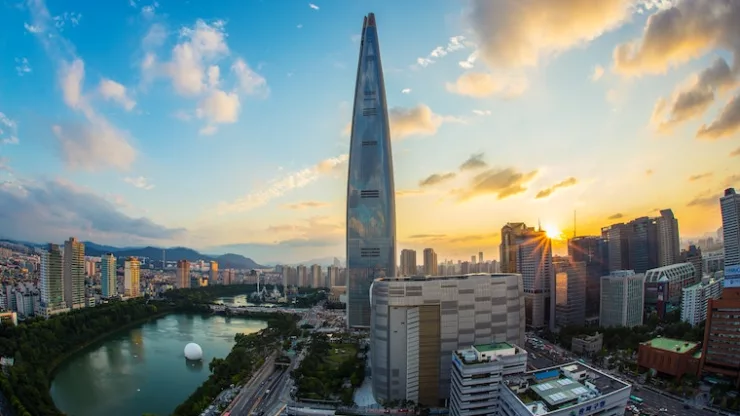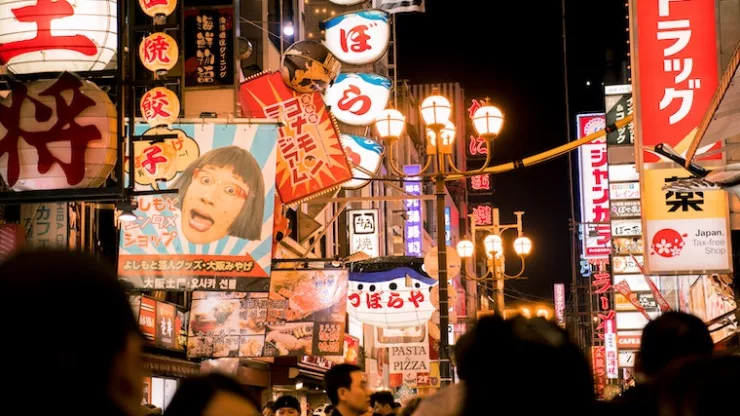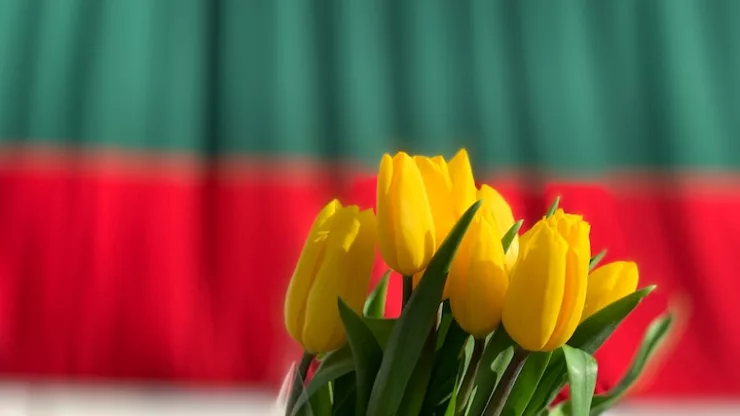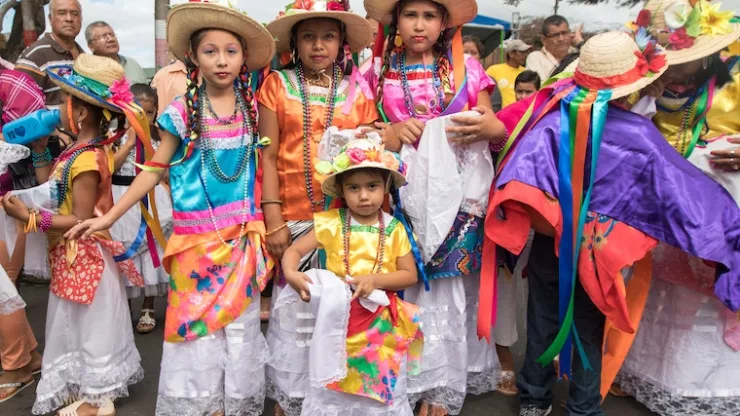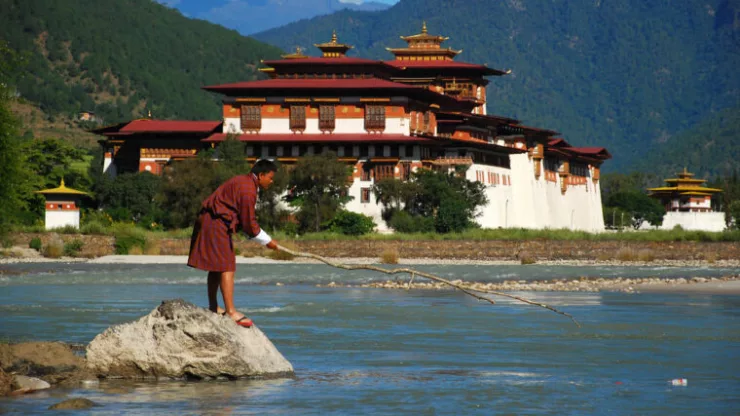Quick Facts
- Capital: Seoul
- Population: 51.71 million
- Official language: Korean
- Currency: Korean Won (KRW)
- Area: 100,210 sq km
1. South Korea has the fastest Internet speeds in the world
South Korea is known for its cutting-edge technology and is home to the world’s fastest Internet speeds.
With an average connection speed of 28.6 Mbps, it is miles ahead of most other countries.
2. The Korean War never officially ended
Although an armistice was signed in 1953, the Korean War never officially ended.
North and South Korea remain separated by the Korean Demilitarized Zone (DMZ), a 4 km wide buffer that stretches 250 km across the peninsula.
3. South Korea is a world leader in shipbuilding
The country is a global powerhouse in shipbuilding, boasting three of the world’s largest shipbuilding companies: Hyundai Heavy Industries, Samsung Heavy Industries, and Daewoo Shipbuilding & Marine Engineering.
Together, they dominate the international market.
4. South Korea has a unique age reckoning system
Instead of counting age from the date of birth, Koreans consider a newborn to be one year old.
Additionally, everyone becomes a year older on New Year’s Day, regardless of their actual birth date.
This practice is called nai.
5. Plastic surgery is popular in South Korea
South Korea has one of the highest rates of plastic surgery per capita in the world.
Many people undergo procedures like double eyelid surgery and nose jobs to achieve a more “western” appearance.
The country is often referred to as the plastic surgery capital of the world.
6. Soju is the country’s national drink
Soju, a distilled spirit typically made from rice, is the national drink of South Korea.
It is widely consumed, and the country has the highest per capita alcohol consumption in Asia.
7. South Korea has a low birth rate and an aging population
The country faces a demographic crisis due to its low birth rate and rapidly aging population.
It is expected that by 2060, nearly 40% of South Korea’s population will be aged 65 or older.
8. The country is a leader in renewable energy
South Korea is investing heavily in renewable energy, with ambitious goals to increase its renewable energy production to 20% of total power generation by 2030.
This includes solar, wind, and other renewable sources.
9. K-pop is a global phenomenon
K-pop, or Korean pop music, has taken the world by storm, with bands like BTS and BLACKPINK gaining massive international followings.
The industry generates billions of dollars in revenue and has become a significant part of South Korea’s cultural exports.
10. South Korea is a major player in the video game industry
The country is a major force in the global video game industry, with companies like Nexon, NCSoft, and Netmarble creating successful games played worldwide.
Additionally, South Korea is home to a thriving esports scene, hosting numerous international competitions.
11. The Hangul writing system is unique to Korea
Hangul, the Korean alphabet, was created in the 15th century by King Sejong the Great.
This writing system is unique to Korea and consists of 14 basic consonants and 10 basic vowels, making it easy to learn and use.
12. Jeju Island is a popular tourist destination
Jeju Island, a volcanic island off the southern coast of South Korea, is a popular destination for tourists and honeymooners.
The island is known for its stunning landscapes, including waterfalls, lava tubes, and the famous Hallasan Mountain, the highest peak in South Korea.
13. Taekwondo is the national sport
Taekwondo, a Korean martial art, is the national sport of South Korea. It is practiced by millions of people worldwide and is also an official Olympic sport.
14. South Korea has the world’s longest seawall
The Saemangeum Seawall is the world’s longest man-made seawall, stretching 33.9 km along the Yellow Sea.
The project was completed in 2006 and aimed to create new land for agriculture and industrial development.
15. Korea has a unique cuisine
Korean cuisine is known for its bold flavors and variety, with staples like kimchi, a fermented vegetable dish, and dishes like bibimbap and bulgogi.
Korean food often includes a variety of side dishes, or banchan, served alongside the main course.
16. South Korea has the highest rate of college-educated individuals
The country has a strong emphasis on education, with the highest rate of college-educated individuals among the Organization for Economic Co-operation and Development (OECD) countries.
This focus on education has led to a highly skilled workforce and a competitive economy.
17. Hallyu, the Korean Wave, has spread Korean culture worldwide
The “Korean Wave,” or Hallyu, refers to the global popularity of South Korean culture, including K-pop, K-dramas, and Korean cuisine.
This phenomenon has increased South Korea’s cultural influence and attracted millions of tourists to the country.
18. The Han River runs through Seoul
The Han River is a major river that runs through Seoul, the capital of South Korea.
It is a vital source of water, transportation, and recreation for the city’s residents.
19. South Korea has a high-speed train network
The country’s high-speed train system, known as the KTX, connects major cities like Seoul, Busan, and Daegu.
The trains can reach speeds of up to 300 km/h, making travel between cities fast and convenient.
20. The demilitarized zone (DMZ) is a popular tourist attraction
Despite its tense history, the DMZ between North and South Korea has become a popular tourist attraction.
Visitors can tour the area, learn about the history of the Korean War, and even step foot into North Korea at the Joint Security Area (JSA) in Panmunjom.
21. South Korea is a major player in the automotive industry
The country is home to major automotive companies like Hyundai, Kia, and SsangYong, which produce and export vehicles worldwide.
South Korea is also investing heavily in the development of electric and autonomous vehicles.
22. The traditional Korean house is called Hanok
A traditional Korean house, or Hanok, is characterized by its wooden structure, curved roofs, and floor-based heating system called ondol. These houses are designed to be in harmony with their natural surroundings.
23. South Korea has a vibrant film industry
The South Korean film industry has gained international recognition, with movies like Parasite, Oldboy, and The Host receiving critical acclaim.
The Busan International Film Festival is one of Asia’s most significant film events, showcasing the best in Korean and international cinema.
24. The country has a national health insurance system
South Korea has a national health insurance system that covers all citizens.
The system provides comprehensive healthcare services at an affordable cost, ensuring that everyone has access to medical care.
25. South Korea is home to many UNESCO World Heritage sites
There are several UNESCO World Heritage sites in South Korea, including the Changdeokgung Palace Complex, Hwaseong Fortress, and the Gyeongju Historic Areas.
These sites showcase the country’s rich history and cultural heritage.
26. The Taegeuk symbol represents balance and harmony
The Taegeuk, a symbol found on the South Korean flag, represents the balance and harmony between the cosmic forces of yin and yang.
The flag’s design also includes four trigrams, which symbolize the elements of heaven, earth, water, and fire.
27. Namsan Tower is a popular landmark in Seoul
Namsan Tower, also known as N Seoul Tower, is a popular landmark and tourist attraction in Seoul.
The tower offers panoramic views of the city and has become a symbol of modern South Korea.
South Korea FAQ
What is the capital of South Korea?
The capital of South Korea is Seoul, a bustling metropolis that serves as the country’s political, economic, and cultural center.
What is the official language of South Korea?
The official language of South Korea is Korean, which is spoken by the majority of the population.
What currency is used in South Korea?
The currency used in South Korea is the Korean Won (KRW).
Is South Korea safe for tourists?
Yes, South Korea is generally considered a safe destination for tourists. The country has low crime rates and a well-developed infrastructure for travelers.
What is the best time to visit South Korea?
The best time to visit South Korea is during the spring (April to June) or autumn (September to November) seasons when the weather is mild and the landscapes are at their most beautiful.
Can foreigners drive in South Korea?
Yes, foreigners can drive in South Korea. However, they must obtain an International Driving Permit (IDP) before driving in the country.
Additionally, drivers should be aware of local traffic rules and regulations.
What are some popular South Korean dishes?
Some popular South Korean dishes include kimchi, bibimbap, bulgogi, tteokbokki, and japchae.
These dishes offer a unique combination of flavors and textures that are a hallmark of Korean cuisine.
Do I need a visa to visit South Korea?
Visa requirements for South Korea vary depending on your nationality.
Citizens of many countries, including the United States, Canada, and most European countries, can enter South Korea visa-free for short stays.
It is always advisable to check visa requirements with your local South Korean embassy or consulate before planning a trip.
What is the time difference between South Korea and the United States?
South Korea is in the Korea Standard Time (KST) time zone, which is 13 hours ahead of Eastern Standard Time (EST) and 16 hours ahead of Pacific Standard Time (PST). However, South Korea does not observe daylight saving time, so the time difference may vary during the year.
How do I get around in South Korea?
South Korea has an extensive and efficient public transportation system, including buses, subways, and trains.
The high-speed train network, KTX, connects major cities, making it easy to travel across the country.
Taxis are also readily available and relatively affordable.

I am a fun fact enthusiast and creator of Facts On Tap.
I love to share my knowledge and curiosity with readers and inspire them to learn something new every day.
When I’m not writing, I enjoy traveling, reading, and playing trivia games with my friends.
